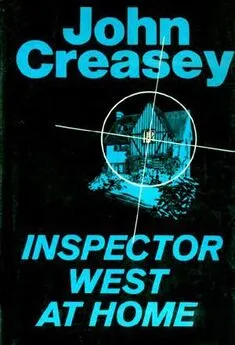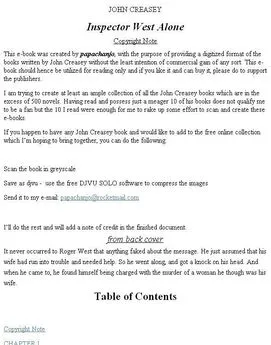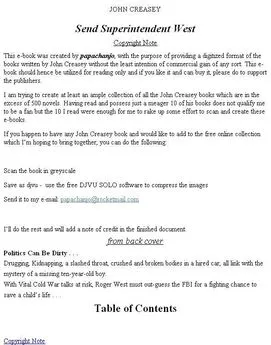John Creasey - Inspector West At Home
- Название:Inspector West At Home
- Автор:
- Жанр:
- Издательство:неизвестно
- Год:неизвестен
- ISBN:нет данных
- Рейтинг:
- Избранное:Добавить в избранное
-
Отзывы:
-
Ваша оценка:
John Creasey - Inspector West At Home краткое содержание
Inspector West At Home - читать онлайн бесплатно полную версию (весь текст целиком)
Интервал:
Закладка:
“That’s odd,” Roger said.
“Yes,” Cornish dropped that subject and went on : “I’ve been with Smith of AZ Division most of the day, trying to find Malone and Pickerell. We haven’t had any luck. Malone’s reputation is worse than I thought it was. I should keep my eyes open, if I were you.”
“I’ve just about sized him up,” Roger said.
“I hoped you would. How are things?”
“I suppose I shouldn’t grumble,” Roger said.
Cornish rang off and Roger returned to the lounge. He stood in front of the fireplace with his hands deep in his trousers pockets. Mark contemplated him with a frown of concentration on his forehead. Janet had gone to bed and Tennant was pretending to be immersed in an evening paper.
Roger looked at him.
“Do you feel tired ?” he asked.
“Who, me?” Tennant dropped the paper and jumped up. “I’m never tired.”
“Who, me ?” asked Mark, forlornly.
“Both of you,” said Roger. “I think we’d better keep an eye on Oliphant’s .house. Do you know where it is, Mark?”
“He’s in Cheyne Walk, just round the corner from a flat I used to have,” said Mark. “Any instructions?”
“Just keep a lonely vigil,” Roger said with a grin.
The others seemed glad of the opportunity to go out, but when they had gone Roger wondered whether it were wise. Abbott had been generous when he had asked to be allowed to handle Oliphant, but it might have been better to have put Yard men to watch him. The danger was that Oliphant would probably recognise a Yard man at sight.
Roger went to bed; Janet, now that Lois had gone, was less on edge and she looked very tired and spoke sleepily from the pillows.
“Back home tomorrow,” she said; “we needn’t stay here now, darling, need we?”
“No,” said Roger.
An Irish maid brought morning tea at eight o’clock. The sun shone through the net curtains at the window and made even the grey slate roofs of adjoining buildings look bright and cheerful. Downstairs, the BBC announcer reading the news had bright things to say about the economic state of the nation.
Janet was fresh-eyed as she sat up in bed, but when she got up she felt dizzy and sat down again abruptly. Startled, Roger said :
“Are you all right ?”
“Er — yes, I’m fine,” said Janet. She was smiling, although she looked pale, the change in her since she had got out of bed was astonishing. “Darling,” she said in an unsteady voice, “sometimes you’re as blind as a bat!”
“Oh,” said Roger. “Am I?”
“I’ve suspected it for some time but I wanted to be really sure. I was sure on my birthday, but I couldn’t worry you after Abbott came.”
“What are you talking about?” demanded Roger, completely mystified.
Janet’s eyes were dewy. “Darling,” she said, “doesn’t morning sickness mean anything to you?”
“Morning —” Roger began, and then his expression altered, he stared incredulously, started to speak but stopped, tongue-tied. He moved and looked down at her as she stared at him, smiling. He gasped : “No ! No, darling, not a baby!”
“Well,” said Janet. “It’s five years since we were married, or had you forgotten? The marvel is that it didn’t happen before.” She laughed. “What shall we call him, if it’s a boy?”
Roger felt like a man in a dream.
He should have realised it for several days past, or at least suspected it. Everything which had puzzled him was explained, her excitability and quick changes of mood, the ease of her tears, her occasional moments of acerbity.
His first reaction was of delight tinged with anxieties about the little luxuries that he would not be able to provide because of the war. A more urgent matter was the possibility that in his amazement he had made her think that he was lukewarm about it. Had he been sufficiently enthusiastic? Or had he depressed her ?
He had left her to do the packing while he went on to open the house, to get the car and to get in touch with Mark before going to the Yard. He had only vaguely outlined his own programme and he hardly gave a thought to Malone and Oliphant. His mind could not grapple with those problems as well as digest Janet’s news. He travelled by taxi and now and again caught himself grinning inanely; when he did so he closed his mouth firmly. Once, when he lit a cigarette, he began to grin so widely that it dropped from his lips. He smothered an exclamation of annoyance, then surrendered himself for five minutes to an orgy of self- congratulation.
It would be easier to make a detour and drive along the Embankment where he expected to find either Tennant or Mark. He saw young Tennant, and wondered what had possessed him to give a job which required an expert to Lois’s fiancé, and he was relieved that Mark must be somewhere in the offing.
Tennant started.
“Oh, it’s you, is it?” said the tousled young man. “I thought it was another policeman. I’ve been asked what I’m doing here twice already.”
Roger smiled and Tennant went on :
“What are you so pleased about?”
“Oh, I’m not pleased,” said Roger. “Where’s Mark?”
“At the other end of the street.”
“Has anything happened ?”
“No one’s gone in or out of the place.”
“They will,” said Roger. “It’s a tiresome business, but don’t get impatient. This is what you worried me for, after all!”
“I didn’t think a policeman’s job was so dull !”
“Tell Mark I’ll have you relieved at half past ten, will you? And then perhaps you’ll come to my place and sleep there ?”
“If it’s all right with you, it wouldn’t be a bad idea,” said Tennant.
Roger returned to his taxi and his good spirits gained the ascendancy. Nothing could go wrong on such a morning.
He paid off the cabby outside his house and hurried along the path, whistling. He opened the front door, stepped through and closed it, then frowned, because the house was in darkness. He groped for the hall switch and pressed it down; still there was no light.
“The bulb’s gone!” said Roger. He went forward a step and put his hand inside the lounge door, pressing that switch down. This time the light made him narrow his eyes, and blinded him with its flare. Then his features stiffened and he stared about him in growing stupefaction.
Nothing was in order.
Against the wall, the piano was in pieces, gaping open, every string broken and hanging loose. The carpet had been slashed across and across, and left in little strips. An armchair had not only been ripped open but the wooden framework had been chopped to pieces. Everything breakable was broken, everything tearable was torn, pictures were down, the wallpaper was covered with great daubs of red paint. It was a scene of such devastation that at first he did not realise its significance.
Then Malone spoke from behind him.
“How do you like it, copper? And what do you know?”
CHAPTER 21
Tennant Loses His Temper
ROGER STARED round at the man.
Malone wore a suit of a blue that was bordering on heliotrope. His marcel waves were dressed with great precision and the grease from his hair made his forehead glisten. He stood with his hands in his pockets and the winged shoulders of his coat were so wide that they nearly touched the door posts on either side. His thin red lips were set in a sneer which he doubtless considered intimidating.
Roger saw all that vaguely.
Far more vivid in his mind’s eye was Janet — a composite picture of her gaiety that morning, her joy, the happiness with which she looked forward to coming home, and an imaginary picture of her when she saw the chaos in the lounge. He wondered whether the other rooms had been wrecked; Malone had probably made a thorough job of it.
“Keeping your mouth shut won’t help you,” said Malone.
A wave of cold anger passed through Roger, visible in his expression. The sneer faded from Malone’s face and was replaced by a wary look.
“Listen —” he began.
Roger said : “Malone, I charge you with causing wilful bodily harm to a number of persons, with conspiring to defraud, with theft and looting. I arrest you in the name of the law and warn you that anything you say may be used in evidence. Do you hear me ?”
Malone said : “You’re crazy!”
“You’re under arrest,” Roger said. “Anything you do now will be an attempt to resist arrest. I don’t know whether we can get you for murder, but even if we can’t, be very careful. Next to murder, violence to a policeman will be the most serious charge on the calendar.”
“You’re off your nut,” Malone said, still very wary. “You can’t do a thing, West.”
“You poor fool!” said Roger, scathingly. “You really think you can get away with it? Every policeman in this country is after you. You haven’t even a hope of keeping away from them for the rest of the day. Whatever you do will only make it worse for yourself. If you give yourself up and make a statement, you might get a lighter sentence. It’s your only real hope.”
“Shut your trap!” snapped Malone, “I didn’t come here to listen to talk from you.”
“I’m not interested in why you came,” said Roger. “I’ve told you the truth and if you like to play the fool, that’s up to you. I don’t know how many men you’ve got with you —”
“I brought plenty,” Malone said, his eyes narrowed. “Quit the spieling, West. No one can touch me. How much do you know?”
“As much as everyone at the Yard knows,” Roger said. “We’ll be moving later in the day.”
Malone said thinly : “West, I reckon your wife will be coming here soon. Once before, I took her away to warn you what would happen if you stuck your head out too far. Now it’s coming. If you don’t talk, I’ll deal with her different.” He kept his hands in his pockets, where Roger sus-pected that he had a knife, perhaps a gun. Mention of Janet brought a revival of the cold fury; it made him tremble from head to foot and he had to fight against throwing himself at the gangster — the one fatal thing to do. “You saw me deal with that Cartier dame,” Malone continued, “that was nothing to what I’ll do to your wife. Tell me what you know.”
“Why Cox killed his wife,” said Roger.
Malone moved.
His trick of ending immobility in a sudden cyclonic movement succeeded in taking Roger by surprise. He backed away but caught his foot against a part of the broken chair and staggered against the mantelpiece. Malone struck him with the flat of his hand. It did not account for the sharp, stinging pain in Roger’s cheek nor the warm trickle of blood. He saw the man’s hand in front of him, a razor blade held between the middle and index fingers. He knew that Malone would gladly batter him as he had the room; yet he was less afraid than angry.
“That’s just a little idea of what’s coming to you,” Malone said thinly. “Did the Randall dame talk?”
“She didn’t need to.”
“That’s a lie. Did she talk?”
Roger said : “I’ve warned you, Malone.”
Malone sneered. “I’ve heard busies before. Talk, that’s about all they can do. If you caught me you couldn’t keep me.” He raised his hand threateningly. By a sleight of hand he moved the blade so that it was held between the tips of his fingers. He made a sweeping movement and the blade passed within an inch of Roger’s eyes. For the first time Roger felt only fear of what could have happened.
“I’ll give you two minutes,” Malone said.
From outside there came a shrill whistle, similar to the one that Roger had heard at Mrs Cartier’s flat and that Mark had heard in the ‘Saucy Sue’. Malone stiffened and half turned his head. Roger kicked at him, aiming for his groin. He caught the man’s thigh and Malone lost his balance, just as two of the gang came into the room.
Читать дальшеИнтервал:
Закладка:










